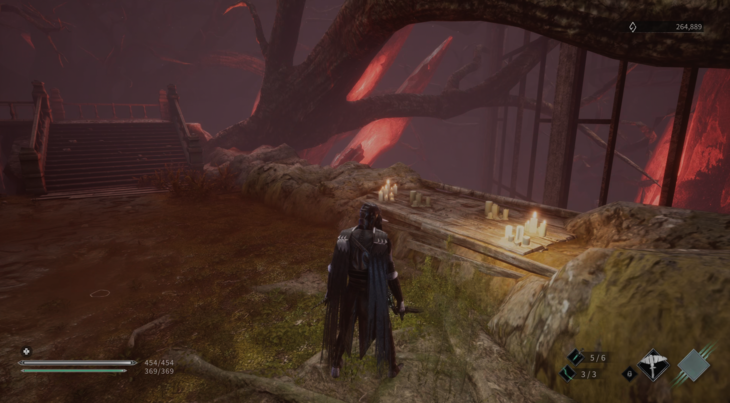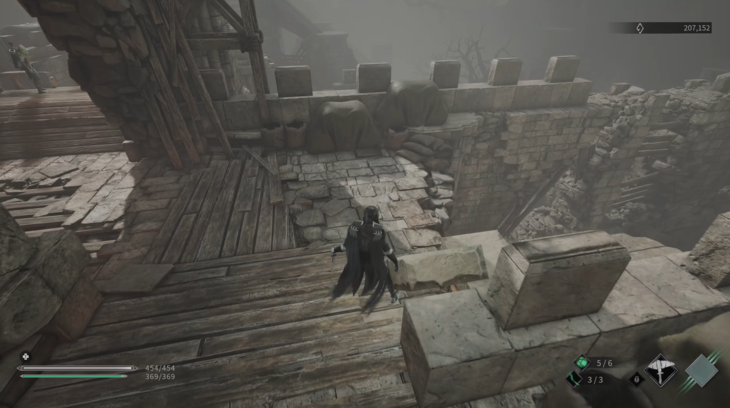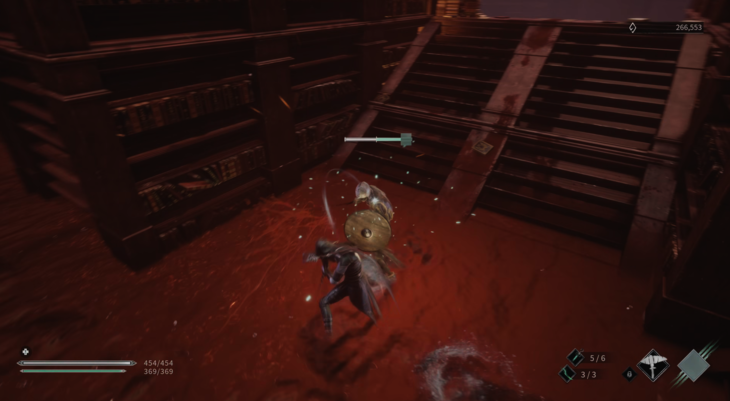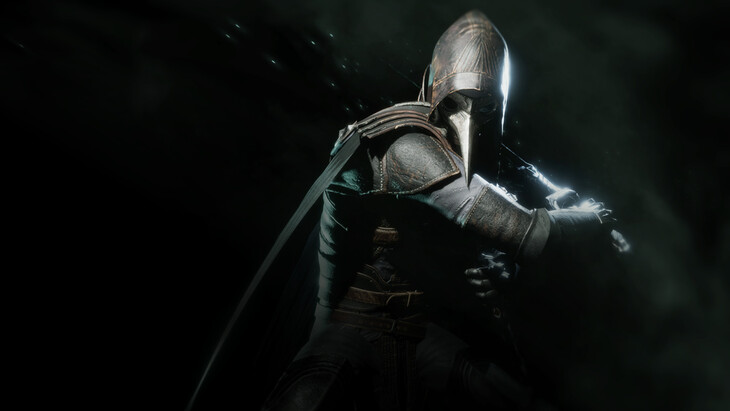
A main character with a plague doctor mask is always an easy way to catch my attention, and Taiwanese developer OverBorder Studio delivered just enough of my favorite things in their announcement trailer for Thymesia to get me intrigued. Now that the game has finally released, did the interest convert to enjoyment?
Thymesia
Developer: OverBorder Studio
Publisher: Team 17
Platforms: Microsoft Windows, PlayStation 5 (Reviewed), Xbox Series X|S
Release Date: August 18th, 2022
Players: 1
Price: $24.99 USD
Thymesia is a bit of a confusing title – in fact, I couldn’t even find an official way to properly pronounce it. The game centers around its mask wearing protagonist, who’s code name is Corvus, and he’s seemingly got a bit of amnesia, as the world has been wracked by a plague that no one seems to remember how it came about. Corvus’ mission is to retrace the memories of prior footsteps, and using the power of alchemy, find a way to put a stop to the plague that’s engulfed the world.
As there’s no voice acting in the game, I went to Youtube to find Team 17 members pronouncing the game’s title – which they called it Thigh-me-see-ah, but given the events of the game, I believe the title should actually be pronounced Thyme-easy-yah, as those words would make both allusions to Thyme as an alchemical component as well as Amnesia since it’s the central plotline of the story.
At any rate, pronunciation aside, Thymesia is a nice take on the popular Soulslike genre. It’s not too deep but just intricate enough to be interesting, it’s relatively short as there’s only four playable biome spaces, and the combat is both quick and punishing.
Combat
At first combat feels a little too harsh, as there’s a considerably less generous window for error off the bat, but thankfully that starts to ease up as you gain new perks. Corvus carries a rapier which does most of his light attacks, a set of Raven feathers he can quickly throw in order to draw enemies from range, but Thymesia’s gimmick is Corvus’ spectral claw. The claw does massive damage and works as a fantastic way to end your combos for permanent chip damage. If you charge up his claw, you gain the ability to swipe plague weapons off enemies for a single use.
This is actually a very cool mechanic because you’re not looting 40,000 different swords and what not that you’re not gonna use like the Souls games, instead you’re able to directly strategize by finding an enemy with a weapon type that’s most beneficial to you given your surroundings.
Early on, I’d wait to find someone with a hammer because that weapon did massive damage to enemies with a shield, or I’d grab a spear in order to keep my distance from enemies who often come in with a flurry of attacks. Each time you kill an enemy, there’s a chance they’ll drop a weapon shard. These weapon shards eventually give you the ability to unlock a weapon which you can then permanently assign to your triangle button.
The plague weapon system is Thymesia’s answer to magic and spells, as you’ll use this game’s version of mana or energy to cast these spectral weapons, and typically each weapon will be available for two to four uses per full bar of energy. Some of the weapons are quite good, such as the previously mentioned hammer or the greatsword.
Some other weapons are only useful occasionally, such as the spear or the shield, while other weapons are a complete waste of time aside from their bonus stats as you level them up. The dagger is painfully useless as it attacks like the spear but without the range which makes you more vulnerable than lethal most of the time, and the bow is almost useless since you already have raven feathers at your command.
The thing that shines more than anything else in Thymesia is the combat and it’s clear most of the attention went into making their combat system rock solid. Thymesia features one of the best combat systems I’ve ever seen in a budget priced title, even if it’s not as fully fleshed out as it could have been.
In particular, the raven feathers have a lot of upgrade options but never seem to be of much use other than to pull enemies out of a pack or interrupt a charged attack. While normally this would be a downer, everything else works so well that it’s acceptable to forgive the ranged attacks for not quite feeling finished.
Atmosphere
As I mentioned earlier in this Thymesia review, this isn’t a deep game nor is it long, but all four of the biomes are incredibly well detailed. The plague wracked town feels desolate and full of despair, while the Sea of Trees (clearly inspired by Blight town) is both as daunting as it difficult to navigate. The Fortress looks nice, but it’s a typical environment for this type of game, so it’s not nearly as special as it could have been had this not been a standard set piece.
I think I’d have to pick the Royal Garden area as my favorite of the four locations due to the bloody moat in the library and the crystalized blood caverns that you explore in the sub quests. The lack of voice acting makes the story a little harder to get interested in, but there are notes and things scattered all throughout the world that help fill you in on what’s going on in a new sense to help you make a clearer decision when you get to that point at the end of the game.
The music is perfectly sublime and feels great in the background, but it’s almost a shame that you’ve gotta stop playing to really appreciate it. In combat is really the only time you’ll notice it as the sound gets much louder and you battle with the pounding of the orchestra as you’re dashing and jumping around. Much like the game, the soundtrack is only about 40 minutes long, but it’s a damn fine listen.
Final Thoughts
Ironically, for as short as Thymesia is, I could talk about it a lot longer than other games I’ve played that are twice or more its length. Perhaps it’s because Thymesia ends with you making the potion that may ultimately restore humanity, only for you to see the results of your choices play out, and then the game coyly asks you as the player “Is this the truth?” with a yes or no box.
Ultimately choosing whether or not you believe what you’ve seen to be true doesn’t matter as the game simply automatically reloads your last save before the final battle if you say no, but saying yes puts you back at the title screen (where you can then reload your save) and I was actually hoping for the Nier: Automata type of ending where it completes or deletes your save once you’ve decided it’s the truth.
In the end, the thing I love the most about Thymesia is that it doesn’t try to be anything more than what it is. It doesn’t ask you to spend more time than you should have to in order to fully complete it, while being just long enough to not only leave you wanting more but carefully not overstaying its welcome. It’s not a perfect game by any means, but this is a terrific first attempt from a new developer, and I’m going to be watching OverBorder Studio to see what they’ve got coming down the pipeline next.
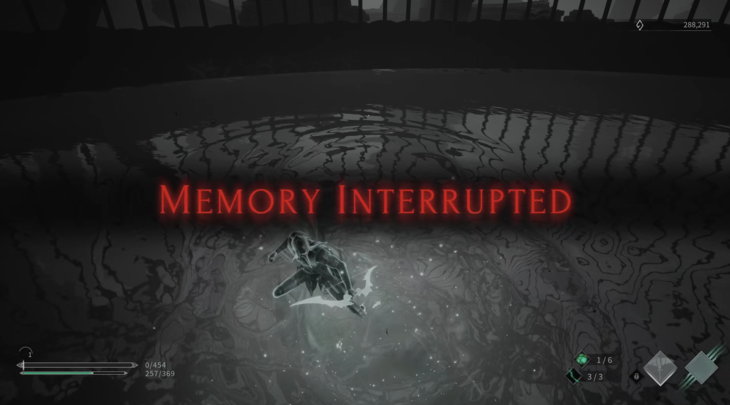
Thymesia was reviewed on PlayStation 5 using a copy provided by Team 17. You can find additional information about Niche Gamer’s review/ethics policy here. Thymesia is now available for Windows PC (via Steam), PlayStation 4, Nintendo Switch and Xbox One.
